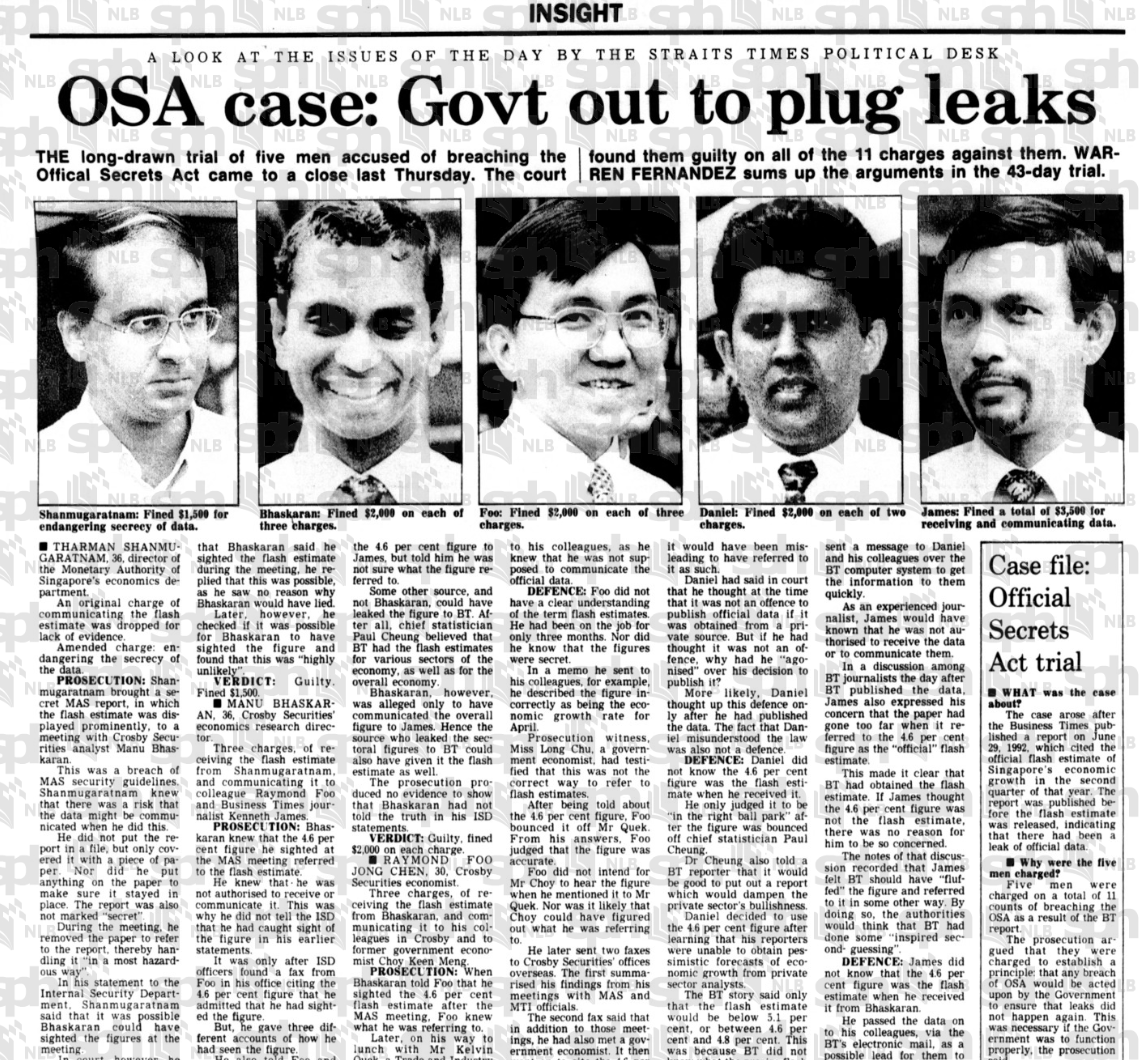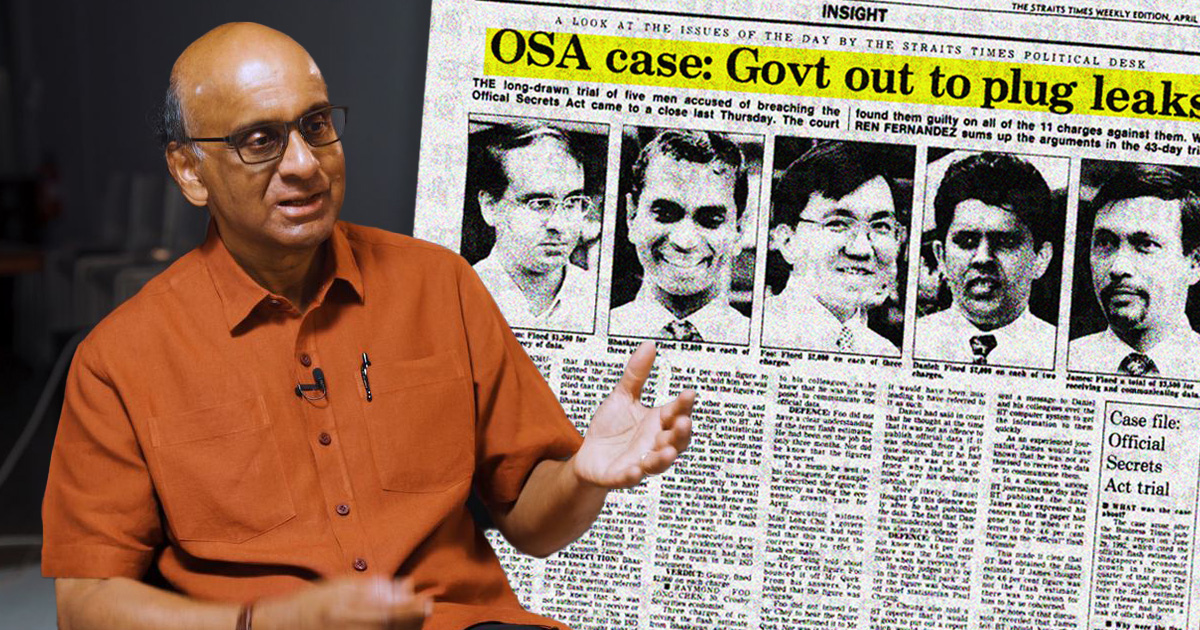When talking about presidential hopeful Tharman Shanmugaratnam's long career, it's hard to skip over his brush with the law, specifically, his conviction under the Official Secrets Act (OSA) in 1994.
The offence? Negligence in allowing sensitive government data to be communicated to the media in 1992.
Tharman was fined S$1,500, while the rest S$2,000.
More than three decades later, Tharman has revealed more information about what transpired behind the scenes—in his words, "a nuanced account"—in an exclusive interview with Mothership.
The case
On June 29, 1992, The Business Times published an article which forecast second-quarter economic growth of 4.6 to 4.8 per cent.
The story was accurate; the government's estimate was 4.6 per cent.
However, this number had not been released officially. They would only be published in August that year.
So how did The Business Times get the number?
This was how Cheong Yip Seng, the former Singapore Press Holdings (SPH) editor-in-chief of the English and Malay Newspapers Division recounted the incident in his memoirs:
"The story came to us in an unusual way.
A private sector economist, Manu Bhaskaran, had visited Tharman Shanmugaratnam at his office at the Monetary Authority of Singapore, where he was then the director of the MAS economics department.
The visitor saw a confidential document on the director's desk; it contained the flash estimates.
Bhaskaran passed the information to his colleague (economist Foo Jong Chen) on his return to the office, who in turned emailed it to Kenneth James, BT's economic correspondent."
Five men—Tharman, Bhaskaran, Foo, James, and Business Times editor Patrick Daniel—were charged and fined after a long-drawn trial that ended in 1994.
If you would like to read about the case in detail, here's a summary of the arguments by the defence and prosecution during the court case.

Tharman: "They got the wrong man"
"It is a strange episode, let me put it that way," Tharman said to Mothership as he gave his thoughts about the case three decades later.
The former senior minister and deputy prime minister prefaced it by saying that he always believed—then and now—that action needs to be taken whenever there is a leak of official secrets.
"If there are leaks of official secrets, we have to take action, have an investigation and let the law take its course, including prosecuting people in court if need be."
But he firmly believes that the prosecution got the wrong man back then.
"Put simply, the prosecution knew that an official figure had been leaked, they knew who it got to, they needed to find a source.
It would have been more difficult—not impossible, but more difficult—for them to prosecute those who received or used the information without also being able to prosecute someone who was a source."
No evidence of intentional communication, no evidence of negligence
The entire case against Tharman rested on him being charged with communicating the figure ("and communication means you're intentionally communicating"), he said.
There wasn't evidence to prove this, he said.
Tharman credits Chan Sek Keong, the Attorney-General at the time who led the prosecution, for realising that there wasn't a case against him midway through the trial.
"He stood up in court and told the judge, that if the court decided that there's no case against the first defendant, who was myself, the prosecution would be willing to proceed without me."
The judge later decided to introduce a lesser charge: negligence in handling sensitive documents.
Tharman also disputed this because there was never any evidence that "the figure was actually sighted at this meeting that I was at, between a group of private sector economists, and me and my colleague".
During the trial, the prosecution brought the actual table from the meeting into the court room.
They sat the prosecution witness at one end of the table and placed the same piece of paper that Tharman had on the other end.
The prosecution then asked her what she could see. She said she could not see anything.
"So the inference was not even backed by the evidence," said Tharman.
Nonetheless, the judge found Tharman guilty of negligence and issued him a fine of S$1,500.
Supported by "people in the system"
From Tharman's perspective, another factor, namely the lack of punitive measures from the government, seemed to back his case.
He wasn't interdicted from his role as director of the Economics Department at the Monetary Authority of Singapore (MAS); he was allowed to continue working throughout the trial and was given time off to go to court.
In the middle of the trial, Tharman even accompanied then-Senior Minister Lee Kuan Yew to Pakistan to provide an analysis of the country's economic challenges.
Senior officials advised him to "fight it to the end".
The conviction didn't even affect his career in public service, and later, politics.
In 1995, Tharman was asked to join the Administrative Service as deputy secretary in the Education Ministry.
In 1997, he was appointed senior deputy secretary and concurrently as special assistant to the MAS managing director, and became a member of the five-member committee chaired by then Deputy Prime Minister Lee Hsien Loong to review the financial services sector.
Less than a decade later, he was encouraged by then-DPM Lee to join politics.
"If they thought there was something wrong with me, they wouldn't have asked me to enter politics and to become a minister. Quite clearly not."
Wife took the brunt of the case
Interestingly, Tharman told Mothership that the entire episode didn't pose as a "psychological setback" for him personally.
The person who "took the brunt of it" was his wife.
Ittogi, who was working as an assistant lawyer on the case alongside main counsel Chelva Rajah, became pregnant with the couple's third child during that season.
Towards the tail end of the trial, she was heavily pregnant but chose to proceed with the work.
"I remember Jane made this quip to the reporters, because the case was taking so long, about how she wasn't sure who was going to deliver first—the judge or her.
As it happened, she delivered first. But it was a tough time for Jane being there as my lawyer."
More from our interview with Tharman:
@mothershipsg An example of an adult decision the admin makes is whether 3am is an okay time to sleep when there's work tomorrow 🤔 #PE2023 #tiktoksg #sgnews ♬ original sound - Mothership
Top image: Mothership file photo, NewspaperSG.
If you like what you read, follow us on Facebook, Instagram, Twitter and Telegram to get the latest updates.



